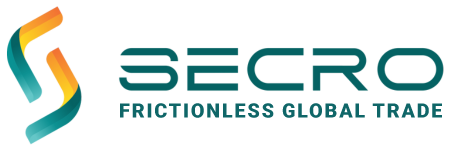Who It’s Built For
Schedule a free pre-discovery session to analyze your business case,
quantify risk reduction, efficiency, and capital gains.

Endless Possibilities For You
Endless Possibilities
For You
Customizable workflows integrate seamlessly with existing systems.
Links teams and tools, removing paper delays.
Simple and easy-to-use tools to adjust workflows.
Built on a modular, ultra-secure technology stack with patented cybersecurity.
Reduce operational costs and prevent trade-related risks with secure, digital-first workflows.
Our flagship product Secro Core is the best solution for modern trade operations
Secro Core helps enterprises move faster – while staying compliant and secure. It’s easy to configure, fast to deploy, and works seamlessly with your systems.
From Excel-like flexibility to audit-ready traceability, Secro connects to your ERP, TMS, CRMS, and more, turning paperwork into automated digital flows in weeks.
Eliminate extra fees, delays, and manual errors.
Automate workflows, reduce back-and-forth.
Always know where documents stand.
Share Your Enquiry
Ready to modernize your trade operations?
Speak to our industry experts to learn how we deliver measurable wins in weeks, not months.
Email us at

After testing the Secro eBL solution, we have seen the advantages of the BL digitalization. We obtained full control over the BL issuing process under our Charter Party while respecting the Carrier’s rights and responsibility through on-line cooperation and approval. Oldendorff Carriers was one of the early signatories of the "25-by-25" BIMCO pledge and we are pleased to see it working.
We achieved a predictable and reliable way to receive original bills of lading, saving time and money
Odfjell appreciates the efficient cooperation with Secro to introduce Electronic documentation in our daily operation. Secro has delivered on time and budget, templates, onboarding sessions and training to Odfjell team and agents. We are now in the process of introducing the benefits to our customers. We are very positive and excited
We reduced the time it takes to get paid by 5 days, which means a 20% better utilization of our working capital
The simplicity of the sign-up process and intuitiveness of the platform allowed for a seamless on-boarding experience and easy adoption. Thanks to Secro we can save a substantial amount of working capital days and reduce the risk of our operations
All our bills of lading can now be drafted, issued and amended in minutes. Secro delivered an impactful, short-term win
Secro has been a breeze to implement and removed the liability of letters of indemnity
We found the Secro platform truly promising, boasting a user-friendly interface with a convenient document exchange process that enabled us to interact promptly and confidently. From our perspective, it would be a successful endeavor in electronic trade
